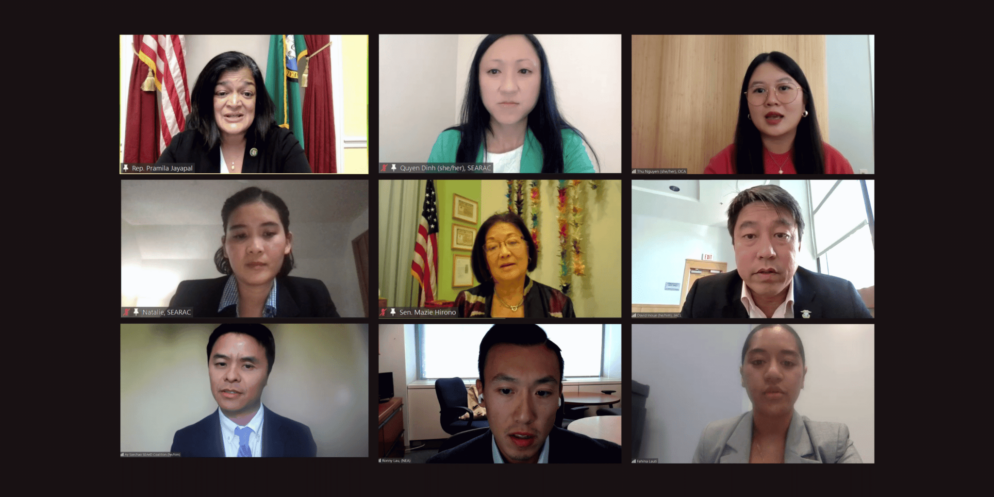Washington, DC – SEARAC is proud to announce the reintroduction of the All Students Count Act into the 118th Congress, sponsored by Sen. Mazie Hirono (D-HI) in the Senate and Rep. Pramila Jayapal (D-WA 07) in the House.
The All Students Count Act would require more comprehensive disaggregation of race and ethnicity data for Asian Americans, Pacific Islanders, and Native Hawaiians by the US Department of Education. Specifically, this bill would require schools, districts, and states to collect and report data for the following ethnicities in state education report cards under the Asian American category:
- Chinese
- Asian Indian
- Filipino
- Japanese
- Korean
- Vietnamese
- Pakistani
- Cambodian
- Hmong
- Lao/Laotian
- Thai
- Taiwanese
- Burmese
- Bangladeshi
- Nepalese
- To the furthest extent possible, additional subgroups such as the Iu Mien and Montagnards
For Native Hawaiian and Pacific Islanders, the following expanded ethnicity categories would be required:
- Native Hawaiian
- Samoan
- Chamorro
- Tongan
- iTaukei
- Marshallese
- To the furthest extent possible, additional subgroups such as Chuukese and Palauan
The bill would also require the Institute of Education Sciences to provide guidance to states on determining the minimum number of students necessary to report on a student subgroup (known as the n-size) that will maximize data reporting for each Asian American and Native Hawaiian and Pacific Islander ethnic group.This is a powerful opportunity to ensure that Southeast Asian American students – as well as other Asian American, Pacific Islander, and Native Hawaiian students – are fully seen by our country’s education systems.
“SEARAC celebrates the historic reintroduction of the All Students Count Act of 2023. Eight years after its last introduction, protecting Southeast Asian American, Native Hawaiian, and Pacific Islander students’ right to be seen is more important than ever. Since that last introduction, our students have lived through the twin pandemics of COVID-19 and anti-Asian hate, experiencing learning loss, struggling with their mental health, and losing loved ones. The solutions our students need are not just to recover to the broken status quo, but to build a better foundation than existed before,” said Quyên Đinh, Executive Director at SEARAC.
“As someone who came to this country alone, at 16, with nothing in my pockets – I deeply understand the unique challenges in the US education system that immigrant communities face and persist for generations after,” said Congresswoman Pramila Jayapal. “Our students deserve visibility at all levels. By ensuring that the Department of Education, state education agencies, and school districts collect and report data for a minimum of 15 Asian American and six Native Hawaiian or Pacific Islander subgroups, we can work to close the education gap in our communities.”
“In Hawaii, we especially understand the importance of diversity and how it impacts the experiences of our communities,” said Senator Hirono. “Without data disaggregation, it’s harder for our schools to address the unique needs of our students. Every keiki deserves to be seen and supported by our education system—this bill will help ensure they are.”
“As an Iu-Mienh American, data equity means that the stories and lived experiences of my family and my community count,” stated Ay Saechao, co-founder of the Southeast Asian Education (SEAeD) Coalition. “Southeast Asian ethnic groups – like those of my community, the Iu-Mienh community – have been invisible and ignored for years due to the lack of data disaggregation. The reintroduction of the All Students Count Act is a positive step toward ensuring that we are invisible no more.“
“My parents are both refugees of the Vietnam War. Because of this, I carry their intergenerational trauma with me, and I realize that I carry their stories with me,” stated a Vietnamese American student who works with Alliance of Rhode Island Southeast Asians for Education (ARISE). “This experience affects my ability to succeed in my education today as well as my plans for the future, because I am always thinking about them and how best I can care for them. These challenges that my family and many in my community have faced are hidden when I don’t get to identify my full self in education data.“
You can watch a recording of our press conference reintroducing the All Students Count Act here.




